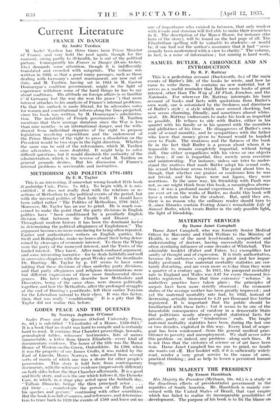METHODISM AND POLITICS 1791 - 1851 _ By E. R. Taylor This
is an interesting, if somewhat wrong-headed little book (Cambridge Univ. Press. 7s. M.). To begin with, it is mis- entitled : it .does not. really deal with the relations or re- actions of Methodism tothe political events of the period, but with the internal politics of that body itself. It should have been called rather " The Politics of Methodism,' 1791-1851." Moreover, Mr. Taylor has an axe to grind. He is much con- cerned to make the point that the party divisions in English politics have " been conditioned by a peculiarly English division—that between the Church and DisSent . . . . Throughout, modern history it has been the dominant factor in determining the political allegiariees. of Englishmen." The argument becomes no more convincing for being often repeated. Earlier and authoritative writers on English parties, like Swift and Bolingbroke, make no bones about their being deter- mined by cleavages of economic interest. To them the Whigs were the party of the moneyed interest, and the Tories of the landed interest. They knew. After much confused argument, and some interesting narrative—for he deals faithfully and well in successive chapters with the great Wesley and the inordinate Dr. Bunting—Mr. Taylor by p. 147 seems to have some inkling that these divisions of class underlay party divisions, and that party allegiances and religious denominations were but different expressions of these more fundamental diver- gences; His later chapters describe how Methodists and Dissenters, being of the same class, were drawn politically together, and how the Methodists, after the prolonged struggles at the end of Bunting's pontificate, left their earlier Toryism for the Liberalism natural to their class. It was this factor, then, that was really " conditioning." It is a pity that Mr. Taylor did not realize this before.


















































 Previous page
Previous page